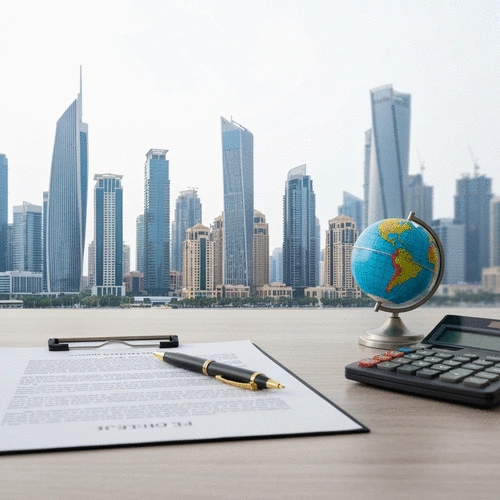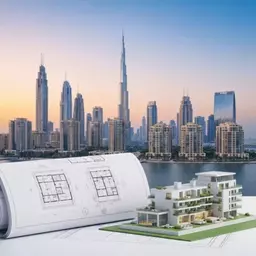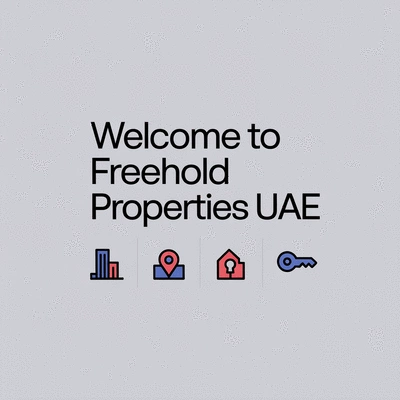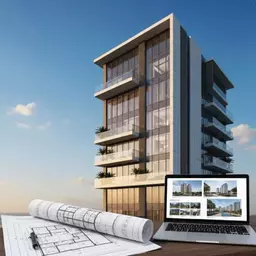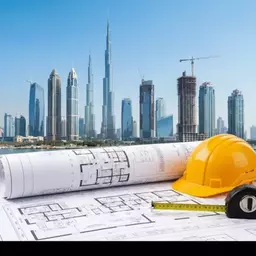Curious about investing in one of the most lucrative real estate markets in the world? The UAE's freehold properties offer unique opportunities for international buyers, but navigating this landscape requires knowledge and preparation. Here’s a concise guide to get you started on the right path.
What You Will Learn
- The difference between freehold and leasehold properties and why it matters for your investment strategy.
- Key legal frameworks, including Law No. 7 of 2006, that protect your ownership rights as a foreign investor.
- How to navigate the buying process step-by-step, ensuring a smooth transaction from start to finish.
- The importance of due diligence and engaging legal consultants to safeguard your investment.
- Understanding your rights and responsibilities as a property owner in the UAE, including inheritance and leasing rules.
Understanding Property Ownership in the UAE: Freehold vs. Leasehold & The Purchase Process
This visual provides a concise overview of the key distinctions between freehold and leasehold properties and outlines the step-by-step process for acquiring freehold property in the UAE for international investors.
Freehold vs. Leasehold Property
Freehold Properties
- Full ownership of property & land.
- Ideal for long-term investment.
- Generally appreciates faster.
- No time limit on ownership.
Leasehold Properties
- Ownership for a set period (30-99 years).
- Reverts to landowner after lease.
- More common in commercial real estate.
- Limited appreciation potential.
International Buyer's Freehold Purchase Process
Assess nationality, identify approved freehold areas.
Find suitable properties, engage a local expert agent.
Obtain NOC, verify title deed, engage legal counsel.
Finalize purchase agreement, make necessary payments.
Prepare passport, visa, deposit proof, ownership certificate.
Register with DLD, understand ownership rights/responsibilities.
Essential Understanding of UAE Freehold Property for International Investors
When it comes to investing in UAE freehold property, understanding the fundamental differences between freehold and leasehold is crucial. As a seasoned expert in the UAE property market, I often see how these concepts can be confusing for new buyers. Simply put, freehold property grants you full ownership of the property and land, while leasehold property typically means you own the property for a set period, usually between 30 to 99 years, after which it reverts back to the landowner.
This distinction is important because it affects your investment's value and your rights as an owner. In the UAE, many prime areas, especially in Dubai, offer freehold properties, making them highly desirable for both local and international buyers.
Defining Freehold vs. Leasehold Property in the UAE
Understanding the key differences between freehold and leasehold properties will help you make an informed decision. Here’s a quick comparison:
- Freehold Properties: You own both the property and the land; ideal for long-term investment.
- Leasehold Properties: Ownership is limited to a specific time period; more common in commercial real estate.
- Investment Potential: Freehold properties generally appreciate faster, making them lucrative.
Knowing these differences can shape your investment strategy and help you choose the right property that aligns with your goals.
Overview of Relevant Laws: UAE Freehold Property Law and Law No. 7 of 2006
The UAE has established a robust legal framework governing freehold properties, primarily through Law No. 7 of 2006. This legislation provides clear guidelines on ownership rights, ensuring that both local and foreign investors are protected. It allows for considerable flexibility in property ownership while maintaining a transparent system for transactions.

One of the key aspects of this law is that it enables foreign investors to purchase freehold property in designated areas without restrictions, which is a significant advantage for those looking to invest in this vibrant market.
The Role of the Dubai Land Department (DLD) and Other Regulatory Agencies
The Dubai Land Department (DLD) plays a pivotal role in regulating property ownership and transactions in Dubai. They ensure that all property dealings are conducted fairly and transparently, providing important services like property registration, issuing title deeds, and maintaining records.
Moreover, the DLD collaborates with various other regulatory bodies to facilitate a smooth buying process for international investors. Understanding their role can significantly ease your property acquisition journey in the UAE.
Understanding the Real Estate Regulatory Agency (RERA)
The Real Estate Regulatory Agency (RERA) is another critical component of the UAE’s property landscape. They are responsible for overseeing the real estate sector, ensuring compliance with laws and regulations, and protecting the rights of investors. Their guidance can be essential for first-time buyers who may feel overwhelmed by the process.
RERA also provides resources such as educational materials and access to official databases, which help international investors make informed decisions. Knowing how to leverage these resources can enhance your property investment experience.
Pro Tip
When investing in UAE freehold properties, always conduct thorough due diligence. This includes verifying property titles, understanding community rules, and consulting with a legal expert. A well-informed investment can save you time and money in the long run!
Legal Steps to Acquire Freehold Property in the UAE
As an international investor, understanding the legal steps to acquire freehold property in the UAE is crucial. This process not only includes knowing your eligibility but also familiarizing yourself with the specific areas where you can invest. I've guided numerous clients through these steps, and I'm here to share practical insights to make your journey smoother!
Initially, it's important to assess your eligibility and identify approved zones for foreign ownership. The UAE offers several freehold zones, primarily in Dubai and Abu Dhabi, where foreign investors can own properties outright. Now, let’s dive into what you need to know.
Initial Considerations: Assessing Eligibility and Approved Zones
Before proceeding, consider the following initial steps:
- Check your nationality against the latest regulations, as some countries may have restrictions.
- Identify the approved freehold zones where you are eligible to invest. Official information on property ownership for expatriates can be found on the UAE Government portal.
- Evaluate your investment goals and how they align with specific property types in these zones.
It's essential to remember that not all areas in the UAE allow full foreign ownership. Understanding the approved zones is key to ensuring you are investing in a property that is legally secure and meets your needs.
List of Freehold Zones: Dubai Marina, Downtown, and More
Here are some of the most popular freehold zones you should consider for your investment:
- Dubai Marina
- Downtown Dubai
- Jumeirah Lake Towers (JLT)
- Business Bay
- Dubai Hills Estate
Each of these areas offers unique benefits, from stunning waterfront views to vibrant community life. Knowing the landscape of these zones can help you make informed decisions.
Foreign Ownership Regulations in the UAE and Investment Zones
Understanding foreign ownership regulations is vital. Generally, foreign investors can acquire properties in designated freehold areas without restrictions. However, it's wise to stay updated, as regulations can change. For comprehensive guidance on buying property in the UAE, including specific regulations, you can refer to resources like the UK government's guidance on buying property in the UAE. You might also want to consult with a legal expert to ensure you're compliant with all laws.
Additionally, investment zones like Abu Dhabi and Ajman may have specific regulations that differ from Dubai, so thorough research and inquiries are essential.
Step-by-Step Guide to the Property Purchase Process
Now that you've assessed your eligibility, let's explore the step-by-step process for purchasing freehold property:
- Conduct research to identify suitable properties within approved zones.
- Engage a reliable real estate agent who specializes in the UAE market.
- Obtain a No Objection Certificate (NOC) from the relevant authorities.
- Verify the title deed to ensure authenticity.
- Finalize the purchase agreement and make necessary payments.

Following these steps can help streamline your purchasing process and mitigate any potential issues.
Title Deed Verification: Ensuring Authenticity
Title deed verification is a critical step in securing your investment. You must ensure that the title deed is legitimate and accurately reflects ownership. This verification process typically involves checking with the Dubai Land Department or the corresponding authority in the emirate where you're purchasing.
Engaging a legal consultant can also help clarify any doubts and ensure that your investment is protected every step of the way!
Required Documentation for International Buyers, Including Property Ownership Certificates
When buying property in the UAE, being prepared with the necessary documentation can save you time and hassle. Here’s a list of documents you typically need:
- Valid passport and residency visa (if applicable)
- Initial deposit payment proof
- No Objection Certificate from the developer
- Property ownership certificate from the seller
Having these documents ready will facilitate a smoother transaction process and help you avoid delays.
Importance of Due Diligence in Property Transactions and Engaging Legal Consultants
Engaging a legal consultant who specializes in UAE real estate is invaluable. They can help you with due diligence, ensuring that all aspects of the transaction are legitimate and safeguarding your investment. Don't skip this step—it's a crucial part of the buying process!
Remember, investing in property is about more than just the purchase; it’s about securing your future. I’m here to assist you through every stage of this important journey!
Ownership Rights and Responsibilities as an International Investor
Understanding your ownership rights and responsibilities as an international investor is essential for a successful investment experience. You will be entitled to the same rights as local owners, ensuring that you can enjoy your property without constraints.
Additionally, it's important to keep in mind the ongoing responsibilities that come with ownership, such as maintaining the property and adhering to community regulations.
Understanding Inheritance Rights for Foreign Owners
As a foreign property owner, understanding your inheritance rights is crucial. The UAE offers various frameworks for inheritance, but it's advisable to prepare a will that aligns with local laws. This ensures your property will be transferred according to your wishes.
Discussing your plans with a legal expert can help clarify how the local laws apply to your situation.
Leasing and Reselling Freehold Properties: Community Rules and Regulations
If you’re considering leasing or reselling your property, familiarize yourself with the community rules and regulations. Different communities may have specific guidelines regarding rental practices or resale procedures.
Adhering to these rules ensures a smooth experience and helps maintain the integrity of the community while protecting your investment.
Implications of Company Registration for Foreigners and Offshore Companies
For investors looking to establish a business in the UAE or purchase property through an offshore company, it’s crucial to understand the implications of registration. There are specific legal requirements that you must fulfill to comply with local laws.
Working with a legal consultant can help you navigate these complexities and make informed decisions that align with your investment strategy.
Frequently Asked Questions (FAQs) about UAE Freehold Properties
What is the main difference between freehold and leasehold property in the UAE?
Freehold property grants you full ownership of both the property and the land it stands on, with no time limit. Leasehold property, on the other hand, grants ownership for a specific period, typically 30 to 99 years, after which the property reverts to the landowner.
Are foreign investors allowed to buy freehold properties in the UAE?
Yes, foreign investors are allowed to purchase freehold properties in designated freehold zones across the UAE, particularly in emirates like Dubai and Abu Dhabi, without restrictions, thanks to legislation like Law No. 7 of 2006.
What role does the Dubai Land Department (DLD) play in property transactions?
The DLD is responsible for regulating property ownership and transactions in Dubai, ensuring fairness and transparency. They handle property registration, issue title deeds, and maintain comprehensive records of all property dealings.
What are some popular freehold zones for international investors in the UAE?
Popular freehold zones include Dubai Marina, Downtown Dubai, Jumeirah Lake Towers (JLT), Business Bay, and Dubai Hills Estate, each offering unique investment opportunities and lifestyle benefits.
What essential documents are required for international buyers?
Key documents typically include a valid passport and residency visa (if applicable), proof of initial deposit payment, a No Objection Certificate (NOC) from the developer, and the property ownership certificate from the seller.
Is due diligence important when buying property in the UAE?
Yes, thorough due diligence is crucial. It involves verifying property titles, understanding community rules, and consulting with legal experts to ensure the legitimacy of the transaction and safeguard your investment.
How do inheritance laws apply to foreign property owners in the UAE?
While the UAE has specific frameworks for inheritance, foreign owners are advised to prepare a will that aligns with local laws. This ensures that their property is transferred according to their wishes and helps avoid potential complications.
Recap of Key Points
Here is a quick recap of the important points discussed in the article:
- Freehold properties grant full ownership of both the property and the land, while leasehold properties are owned for a specific time period.
- Understanding the legal framework, including Law No. 7 of 2006, is essential for international investors to ensure their rights are protected.
- Familiarize yourself with the approved freehold zones in the UAE, such as Dubai Marina and Downtown Dubai, to make informed investment decisions, and refer to the UAE Government's official guidance.
- Follow a step-by-step guide for the property purchase process, including obtaining necessary documentation and verifying title deeds.
- Engaging a legal consultant for due diligence is crucial to ensure a smooth transaction and protect your investment, as highlighted by resources like the UK government's advice on buying property in the UAE.

